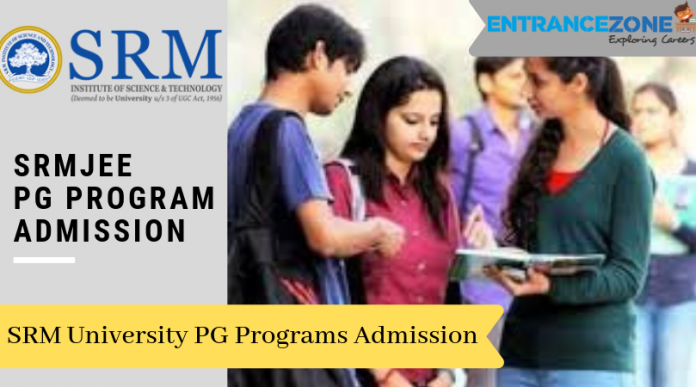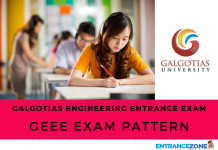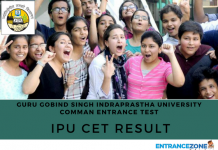SRMJEEE (PG) 2021 exam is held to offer admission into M.Tech program. SRM Institute of Science and Technology has started the Application Process in Online mode. The Online Entrance Examination, will be held tentatively in the month of July 2021 for all branches. Aspirants will be invited for Counselling in the order of Merit on the basis of marks secured in SRMJEEE (PG). A provisional Allotment Letter (PAL) will be issued to confirm the candidate’s admission.
SRMJEEE(PG) Entrance Exam Status
| Exam Notification | Announced |
| Application Window | Open |
Latest Update
SRMJEEE PG Entrance Exam 2021 Application form can be filled until 30 June 2021.
SRMJEEE PG 2021 Important Dates
Contents
|
Events |
Dates Subscribe to Get Updated Information about SRMJEEE (PG) 2021: Application Form (Till 30 Jun), Eligibility |
|
Release of Application form |
Released |
|
Last date to submit the Application form |
30 June 2021 |
|
SRMJEEE PG 2021 |
To be Announced |
|
Announcement of Result |
To be Announced |
|
Commencement of Counselling |
To be Announced |
SRMJEEE PG 2021 Application Form
SRMJEEE PG Application Form 2021 has been released. Interested candidates are required to fill and submit the Application form along with the Application fee.
Application Fee: Rs. 1100/-
How To Fill Application Form?
- Registration: Candidates must fill register themselves by entering basic details and at the end by creating a password.
- Fill Application Form: Candidates are required to enter their personal details, Residential address and qualification details.
- Upload Scanned Documents: Candidates must upload their recent passport size photograph and signature in the prescribed format.
- Submission Of Application Form: The last step is to submit filled in the Application form of SRMJEEE 2021. Candidates paying the Application fee through Demand Draft will have to send it to the given address:
The Director,
The Directorate of Admissions,
SRM University, Kattankulathur,
Kancheepuram District,
Tamil Nadu 603203.
SRMJEE PG 2021 Eligibility Criteria
- Nationality: The candidate must be a citizen of India. NRI, PIO and OCI card issued by the Government of India are also eligible.
- Minimum Qualification: Candidate must have passed qualifying exam Recognised by SRM University with a minimum of 60%.
- Candidates who have qualified TANCET and GATE are also eligible.
Course wise Criteria
|
Specialization |
Eligibility Criteria |
|
Structural Engineering |
|
|
Construction Engineering and Management |
|
|
Remote Sensing and GIS |
|
|
Environmental Engineering |
|
|
Geo Technical Engineering |
|
|
Computer Aided Design |
|
|
Computer Integrated Manufacturing |
|
|
Robotics |
|
|
Solar Energy |
|
|
Power Systems |
|
|
Power Electronics and Drives |
|
|
Telecommunication Networks |
|
|
VLSI Design |
|
|
Embedded System Technology |
|
|
Communication Systems |
|
|
Biomedical Engineering |
|
|
Electronics & Control Engineering |
|
|
Computer Science & Engineering |
|
|
Information Technology |
|
|
Information Security and Cyber Forensics |
|
|
Cloud Computing |
|
|
Chemical Engineering |
|
|
Biotechnology |
|
|
Food and Nutritional Biotechnology |
|
|
Food Safety and Quality Management |
|
|
Genetic Engineering |
|
|
Nanotechnology |
|
|
Big Data Analytics |
|
SRMJEEE PG 2021 Examination Pattern
To prepare for the Entrance Examination, candidates must know the exam pattern of SRMJEEE PG 2021
|
Particulars |
Specifications |
|
Exam Mode |
Online |
|
Duration of Exam |
2 hours 30 Minutes |
|
Language |
English |
|
Type of Questions |
Multiple Choice Questions (MCQs) |
|
Total Number of Questions |
100 |
|
Marking Scheme |
Each correct answer will get 3 marks |
|
Negative Marking |
No negative marking will be given for the wrong answer |
|
Mandatory Section |
Mathematics will be a compulsory section for all courses except Bio-Technology and Food Processing. |
SRMJEEE PG 2021 Syllabus
SYLLABUS Civil (Code 01)
- Mathematics
- Vector calculus
- Determinants and Matrices
- Analytic function theory
- Differential Calculus, Multiple Integrals and Ordinary Differential Equations
- Numerical Methods
- Probability and Statistics Other Topics
- Mechanics of Solids and Structural Analysis
- Construction and Materials Management
- Concrete and Steel Structure
- Soil Mechanics and Geo-Technical Engineering
- Fluid Mechanics and Water Resources Engineering
- Environmental Engineering
- Surveying
- Transportation Engineering
- Remote Sensing
- Geographic Information Systems (GIS)
Mechanical (Code 02)
- Mathematics
- Vector calculus
- Determinants and Matrices
- Analytic function theory
- Differential Calculus, Multiple Integrals and Ordinary Differential Equations
- Numerical Methods
- Probability and Statistics Other Topics
- Mechanics and Machine Design
- Material Science and Metallurgy
- Thermodynamics
- Refrigeration and Air Conditioning
- Production Technology
- Automotive Engines
- Automotive Transmission
- Strength of Materials
- Casting, metal forming and metal joining processes
- Tool Engineering, Machine tool operation, Metro-logy and inspection
- Engineering Materials, Processing of Plastics and Computer-Aided Manufacturing
- Product Design, Process Planning, Cost Estimate, Design of Jigs and Fixtures and Press Tools
- Operations Research (xiv) Operations Management (xv)Quality Control Reliability and Maintenance
Electrical (Code 03)
- Mathematics
- Vector calculus
- Determinants and Matrices
- Analytic function theory
- Differential Calculus, Multiple Integrals and ordinary Differential Equations
- Numerical Methods
- Probability and Statistics Other Topics
- Networks: Circuit Elements, Laws and theorems – Resonance – Coupled circuits – AC steady-state and Transient Analysis
- Devices: Energy bands, Charge carriers in semiconductors – semiconductor junctions – semiconductor diodes and its types – transistors – FET – SCR – IGBT – DIAC – TRIAC – UJT – Power supplies
- Electronic Circuits: Biasing methods and small-signal models – Transistor amplifier and analysis – Feedback amplifiers and oscillators – Large signal and tuned amplifiers – Frequency response and wave shaping circuits
- Digital: Number systems – Boolean algebra – Logic gates – Logic families – Gate level minimization and combination-al logic – Synchronous and Asynchronous sequential logic – Memory
- Microprocessor: Intel 8085 microprocessor – Intel 8086/8088 microprocessor – Intel 8031/8051 microcontroller – Programmable interfacing devices – Applications
- Control System: Transfer function – Mathematical Modeling – Block diagram reduction – Control system components – Transient and steady-state analysis – Stability analysis – Frequency domain analysis
- Electromagnetic
- Electrical Machines
- Power Electronics
- Solid State Drives & Control
Electronics (Code 04)
- Mathematics
- Vector calculus
- Determinants and Matrices
- Analytic function theory
- Differential Calculus, Multiple Integrals and Ordinary Differential Equations
- Numerical Methods
- Probability and Statistics Other Topics
- Networks: Circuit Elements, Laws and theorems – Resonance – Coupled circuits – AC steady-state and Transient Analysis
- Devices: Energy bands, Charge carriers in semiconductors – semiconductor junctions – semiconductor diodes and its types – transistors – FET – SCR – IGBT – DIAC – TRIAC – UJT – Power supplies
- Electronic Circuits: Biasing methods and small-signal models – Transistor amplifier and analysis – Feedback amplifiers and oscillators – Large signal and tuned amplifiers – Frequency response and wave shaping circuits
- Digital: Number systems – Boolean algebra – Logic gates – Logic families – Gate level minimization and combinational logic – Synchronous and Asynchronous sequential logic – Memory
- Microprocessor: Intel 8085 microprocessor – Intel 8086/8088 microprocessor – Intel 8031/8051 microcontroller – Programmable interfacing devices – Applications
- Control System: Transfer function – Mathematical Modeling – Block diagram reduction – Control system components – Transient and steady-state analysis – Stability analysis – Frequency domain analysis
- Signals and Systems
- Communications (Analog)
- Communications (Digitals)
- Electromagnetic
Instrumentation (Code 05)
- Mathematics
- Vector calculus
- Determinants and Matrices
- Analytic function theory
- Differential Calculus, Multiple Integrals and ordinary Differential Equations
- Numerical Methods
- Probability and Statistics Other Topics
- Networks: Circuit Elements, Laws and theorems – Resonance – Coupled circuits – AC steady-state and Transient Analysis
- Devices: Energy bands, Charge carriers in semiconductors – semiconductor junctions – semiconductor diodes and its types – transistors – FET – SCR – IGBT – DIAC – TRIAC – UJT – Power supplies
- Electronic Circuits: Biasing methods and small-signal models – Transistor amplifier and analysis – Feedback amplifiers and oscillators – Large signal and tuned amplifiers – Frequency response and wave shaping circuits
- Digital: Number systems – Boolean algebra – Logic gates – Logic families – Gate level minimization and combination-al logic – Synchronous and Asynchronous sequential logic – Memory
- Microprocessor: Intel 8085 microprocessor – Intel 8086/8088 microprocessor – Intel 8031/8051 microcontroller – Programmable interfacing devices – Applications
- Control System: Transfer function – Mathematical Modeling – Block diagram reduction – Control system components – Transient and steady-state analysis – Stability analysis – Frequency domain analysis
- Transducers and Industrial Instrumentation
- Biomedical Instrumentation
- Electrical and electronic measurements and instrumentation
- Process control.
Computer Science (Code 06)
- Mathematics
- Vector calculus
- Determinants and Matrices
- Analytic function theory
- Differential Calculus, Multiple Integrals and Ordinary Differential Equations
- Numerical Methods
- Probability and Statistics Other Topics
- Discrete Mathematical Structures
- Micro Processor and Hardware Systems
- Computer Organization and Architecture
- System Programming including Assemblers, Compilers
- Operating Systems
- Programming Methodology & Software Engineering
- Data Structures and Algorithms
- Database Systems
- Computer Networks
Chemical (Code 07)
- Mathematics
- Vector calculus
- Determinants and Matrices
- Analytic function theory
- Differential Calculus, Multiple Integrals and Ordinary Differential Equations
- Numerical Methods
- Probability and Statistics Other Topics
- Chemical process calculations
- Chemical Process Industries
- Mechanical Operations
- Fluid Mechanics
- Heat Transfer
- Mass Transfer
- Thermodynamics
- Chemical Reaction Engineering
- Instrumentation & Control
- Process Engineering Economics
- Bio-Technology (Code 08)
- Cell Structure, Function
- Properties of Nucleic Acids, Protein Synthesis
- Gene Manipulation, Transgenic Microbes
- Plants and Animals
- Metabolism and Bio-Energetic
- Gene Regulation
- Enzyme Kinetics, Fermentation Process, Production of commercially important enzymes
- Recombinant proteins
- Microbial Growth Kinetics
- Biosafety, Bioethics and Intellectual Property Rights Bioconversion
- Fermentation Kinetics, Bioreactors
- Genomics and Proteomics
- Computer Applications in Bio-Technology
- Nano Biotechnology
- Application of Bio-Technology Systems Biotechnology
GIS (Code 09)
- Mathematics
- Vector calculus
- Determinants and Matrices
- Analytic function theory
- Differential Calculus, Multiple Integrals and Ordinary Differential Equations
- Numerical Methods
- Probability and Statistics Other Topics
- Remote sensing: physics of remote sensing
- Photogrammetry: Photogrammetry
- Surveying: Surveying Techniques
- Electronic surveying
- GIS: Terminology
- Geology: Geological Remote Sensing
- Agriculture and forestry
- Environment and disaster studies: EIA
- Urban and regional planning: Urban Planning
Environmental (Code 10)
- Mathematics
- Vector calculus
- Determinants and Matrices
- Analytic function theory
- Differential Calculus, Multiple Integrals and Ordinary Differential Equations
- Numerical Methods
- Probability and Statistics Other Topics
- Environmental Pollution
- Environmental Biotechnology
- Thermodynamics
- Ecology
- Environmental Conservation
- Water Resources
- Ecology and Sustainable Development
- Remote Sensing
- Energy and Environmental
- Environmental Impact Assessment
- Current Topics in Environmental Sciences
- Soil Pollution and Solid Waste Management
- Natural Hazards
- Environmental and Occupational Health
SRMJEE PG 2021 Admit Card
Once the slots are successfully booked, candidates will be able to download the Admit card of SRMJEE PG 2021.
- Hall ticket is the most important document to carry inside the examination hall, without hall ticket candidates will not be allowed to sit for the Entrance Test.
Details on the hall ticket / Admit card
- Candidate’s name
- Photograph
- Address
- Exam centre
- Exam timing
- Instructions
SRMJEEE PG 2021 Result
Results will be announced in August 2021. Qualified candidates will be called for the counselling session.
- Login to the portal using Application no. and Date of Birth.
- The result will be displayed on the screen.
- Check the details and download the result.
SRMJEEE PG 2021 Counselling
- Counselling session for SRMJEEE PG will be tentatively held in August 2021.
- Seats will be allotted to candidates on the basis of rank scored by them in the Entrance Examination.
- Shortlisted candidates will have to register themselves for participating in SRMJEEE 2020 counselling.
- Candidates have to download their Counselling call letter and bring to the counselling venue along with the required document for verification.
- Verification of documents will be done only after the admission fee payment through DD in favour of SRMIST payable at Chennai.
Required Documents For Verification
- SRMJEEE PG 2020 Hall ticket
- SRMJEEE PG 2020 Counselling call letter
- Rank card SRMJEEE PG 2020
- Degree Certificate
- Mark Sheet of Qualifying Examination for all Semesters
- Certificate from University/Institute Last Studied
- GATE 2020 Score Card (if applicable)
- TANCET 2020 Score Card (if applicable)
- Demand Draft of Admission Fee
- Photograph
SRM PG Programs Admission Procedure
- Apply for SRMJEEE PG via SRM official Website.
- On the basis of marks secured in SRMJEEE (PG), Candidates will be invited for a counselling session.
- Candidates can choose their preferred specialisation/branch of study in a particular campus based on fulfilling the programme-specific eligibility criteria and subject to the availability of seats at that point of time.
- Students need to pay the tuition fee and other applicable fees at the time of counselling along with the selection of specialisation/branch.
- For confirming the candidate’s admission, Provisional Allotment Letter (PAL) will be issued.
Test Centres for M.Tech Program
| Tamil Nadu | SRM IST, Main Campus (Kattankulathur, Chennai) |
| SRM IST, Ramapuram Campus, Chennai | |
| SRM IST, Vadapalani Campus, Chennai | |
| Madurai | |
| Vellore | |
| Coimbatore | |
| Andhra Pradesh | SRM University, AP, Amaravati |
| Hyderabad / Secunderabad | |
| Kerala | Ernakkulam |
| Trivanandapuram | |
| Karnataka | Bangalore |
| Maharastra | Mumbai |
| Gujarat | Ahmedabad |
| Madhyapradesh | Bhopal |
| Haryana | SRM University, Sonepat, Haryana |
| New Delhi | New Delhi |
| Uttarpradesh | Ghaziabad |
| Bihar | Patna |
| West Bengal | Kolkatta |
| Odisha | Bhuvaneshwar |
SRMJEEE PG 2021 Important Links
Apply here for SRMJEEE(PG) Entrance Exam
SRMJEEE (PG) 2021 Highlights
| General | Question Paper will be only in English | |
| Mode | Online | |
| Duration | 2: 30 Hours | |
| Question Type | Objective Type Multiple Choice Question (MCQ) Each MCQ has one choice as the correct answer out of the four given |
|
| Marks for the correct answer | 3 Marks | |
| Marks for the wrong answer | No Negative Marks | |
| Official website | https://www.srmist.edu.in/admission-india/ | |









